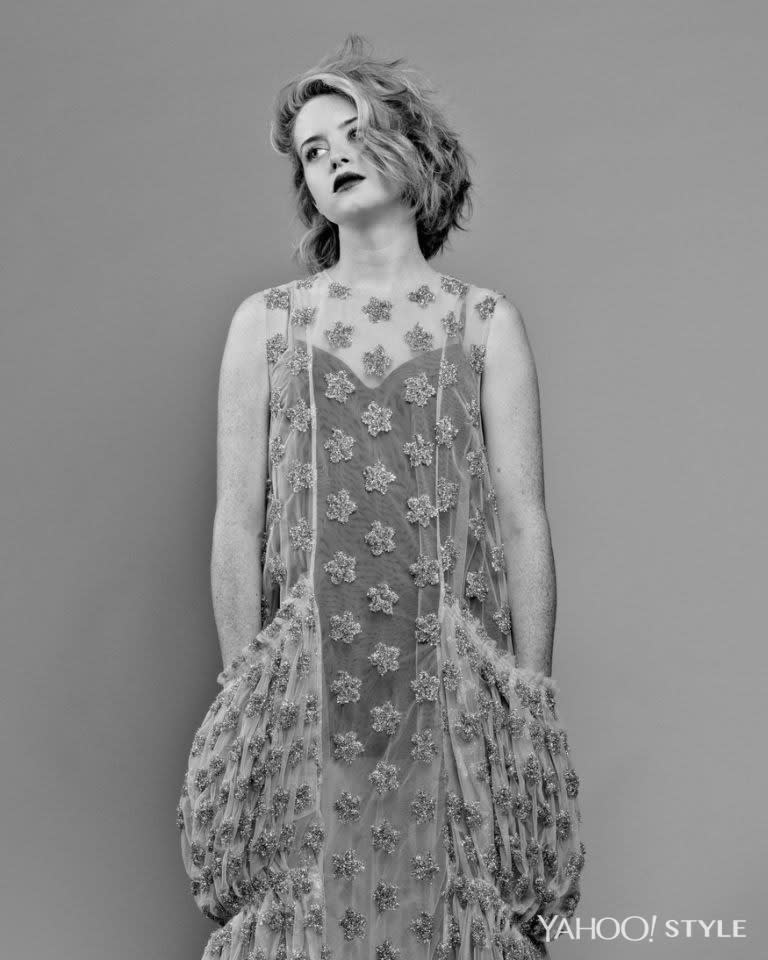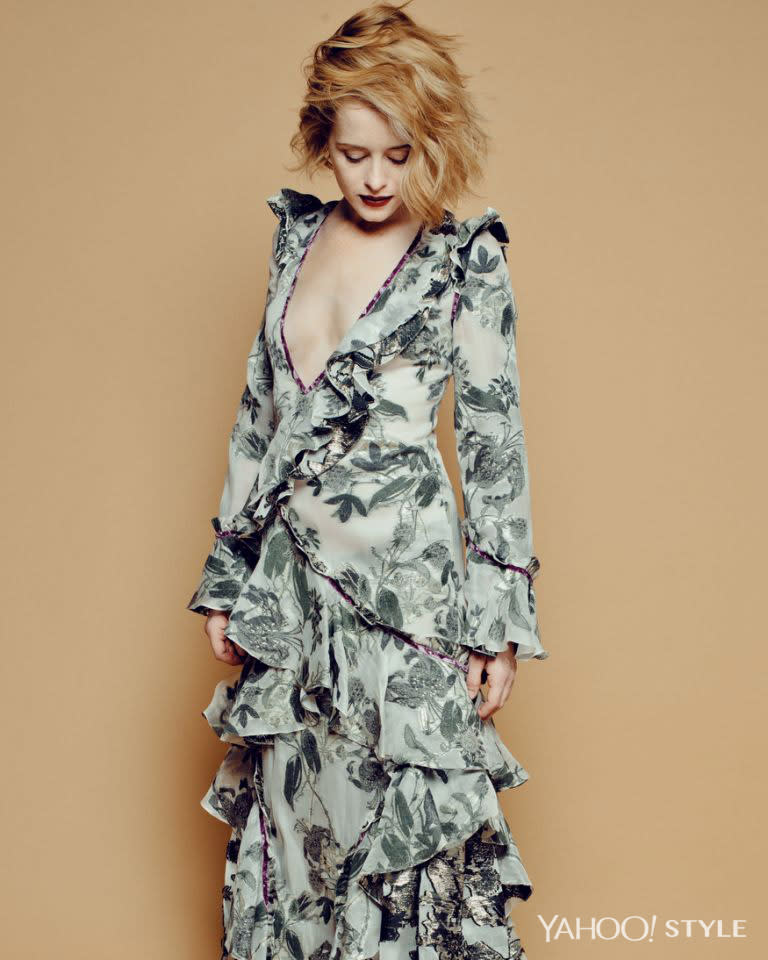'The Crown' Star Claire Foy On Playing the Young Queen Elizabeth, Raising a Newborn, and Having More Fun as a Blonde
If you've watched even just an episode or two of Netflix's The Crown, you've likely already fallen under its spell — lush sets, elaborate costumes, stunning cinematography (it's rumored to be one of the most expensive shows ever produced), but what gives the show its pathos is lead actress Claire Foy, who portrays the first days of Queen Elizabeth with a performance that ranges from naïve to steely to circumspect — often all in the same scene.
Yahoo Style: How did the role come your way?
Claire Foy: Just in the classic way, actually. I just auditioned for it. My agent rang me up and asked, “Do you want to go on a meet?” Of course, at the time I didn’t realize I’d be meeting [director] Stephen Daldry, [writer] Peter Morgan, and Andy Harris, the producer. They’re all quite big wigs. That was a bit scary, but it was just a really lovely chat. I had no expectations of getting it or anything, so I think I was really quite relaxed. It was just really lovely. Then I had a second audition, and then found out that I’d got it, which was a real shock. Really exciting.
How familiar were you with the Queen's early years?
I think everybody in England and around the world is familiar with her because she’s been around for my entire life — our generation has grown up with her there as a prominent figure. But I wasn’t aware of her as a young mother or anything like that. Obviously, I knew everything about Edward the 8th and the abdication of the throne, and the fact she wasn’t destined to be Queen, but that’s what happened. Her life could’ve been very, very different. I didn’t really know anything about the death of her father and how unexpected it was.
How did you find yourself inhabiting that state of mind?
I think Peter’s scripts are amazing and they do all the work for you, really. Also, I think if you’re grieving or you’re in massive amounts of shock, I think you just take every day as it comes. I don’t think as a character she could’ve thought about the magnitude of what was happening to her and the job that she was taking on and how that would change her life. I think she would’ve had a breakdown. She so obviously didn’t, in public anyway.
Would you say that was the most challenging part of the production?
I had a newborn baby, so-
Oh, my gosh. Congratulations.
Thanks very much. That was quite challenging. Amazing but challenging. It was also one of the biggest jobs I’d done, and there was a lot to get right. It wasn’t just about having an emotional connection to it. It was also about getting the physicality and the voice, and all those things that come with a character, so there was a lot of homework to do as well in order to, when you were on set, be able to be relaxed and just play the scene naturally. It took quite a lot of inhabiting to get to the point where you’re comfortable with that.
Did you work with a coach who helped you do those things?
Yes. William Conacher, who’s the best dialect coach in the world because he didn’t ever say to us, “This is how she sounds. You’ve got to do it.” We all found our collective sounds, which I think is really important, but we also found ourselves in the voices. It wasn’t like we were trying to do an impression because otherwise we’re trying to be perfect the entire time. You’re not going to be able to play a scene, so he was just amazing at giving us little ways in and funny little physical things that distract you from your voice and you end up doing it anyway.
Obviously the Queen has been portrayed on film and in theater numerous times already. Did you feel any pressure from that?
No. Those performances matter because they’re amazing, but I tried not to let them affect me. I watched The Queen very early on, mainly just because it’s a really good film, and I could pretend I was doing research, but luckily, the pressure was off in that way because I was playing her younger and there’s not that much footage or accounts of her when she’s at that age. The pressure to be an identical version of her, I didn’t really feel that so much. I didn’t go and see the play. I would’ve loved to but I just think it would’ve terrified me, if I’d have gone to go and watch those two amazing women do it. I would’ve probably not been able to do the job.
That pressure would be too great!
As an actor, you’re used to other people playing, especially if you do Shakespeare or you’re used to that “There’s been a thousand people before you” idea. Obviously a couple of people have played her, but it felt very original to me. It felt like a very original story.
As the Queen rises to power, there's this tension because she's obviously a woman who ascends the monarchy and position of power. In ways, it feels remarkably topical and yet also very specific to its time and place.
I think there’s a real risk to turn her into a sort of feminist icon. I think it’d be, not missing the point, but a bit too convenient because it’s far more complicated than that. I think she’s definitely in a man’s world and she’s definitely trying to find her way through it and do the job to the best of her ability, but the thing that’s so amazing about the show and her is she’s a fully fledged, fleshy human being. She is a mother, she’s a wife, she’s the Queen, she’s a daughter. Every aspect of her life is so complex, when it comes to the fact that at the center of it, she’s got to be the head of the family, the head of the church, the head of the country. It would be amazing to identify it as one thing, of her as a leader, but it's not simply that.
We all inhabit different roles in different arenas.
That’s why I think it feels modern, but it is very much a product of its time. The fact is that they have a very conventional, 1950s marriage, she and Phillip, and she wants it to be that way. She insists that to love, honor and obey being part of the marriage service [in the first episode], and that she very much, as time went on, insisted that he was the master of the house and she was the Queen. I do think it’s very much of its time as well as being relevant for today because we're watching people struggle with things that we all struggle with.
Have there been other projects that you've been free to work on?
I did do a film in the summer, which was lovely. It's called Breathe with Andrew Garfield, directed by Andy Serkis. Andrew Garfield plays a polio sufferer called Robin Cavendish, and I play his wife, Diane Cavendish, based on a true story. That’s why the hair.
Yes, you're blonde!
I know. That was for the film. I never, ever would’ve done it. I’m so dark naturally, so that’s one of the real perks of the job. You can completely change the way you look and the risk is that you might look like rubbish, but you could always say, “I’m doing this for work.” It isn’t like you’ve taken a massive risk.
You can absolve yourself of responsibility.
You can say, “It wasn’t my fault!” Also, they get the best possible people to do it. I love it. I really do think blondes have more fun.
Do you? Do people react differently to you?
Definitely. A lot more friendly. I think it’s just a natural thing. It’s just more shiny and, "Ooh, the light catches you." When you’re brunette, I think your eye isn’t drawn in the same way. I’m probably going to be blonde for the rest of my life. I’m going to be really depressed to go back.






